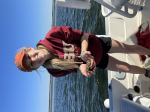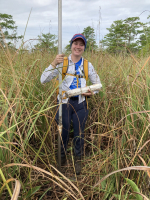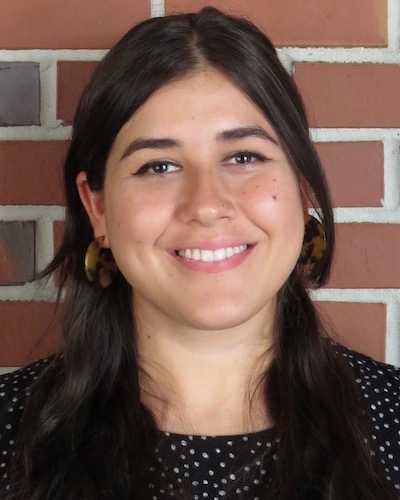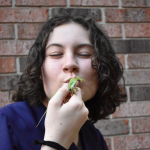Graduate Student Directory
.jpg)
Benjamin Ajayi
Room: 4055
KIN
I research how plant variation reflects evolutionary diversification and the reconstruction of plant genes' evolutionary histories using molecular systematics and morpho-anatomy
- Major Professor: Dr. Austin R. Mast
- baa23a@fsu.edu

Laura Anthony
Room: 2024
King
Mailcode: 4295
I am interested in the ecophysiology of habitat-forming deep-sea corals. My dissertation research focuses on the environmental drivers that affect the reproductive biology of several reef-forming deep-sea corals around the globe.
- Major Professor: Dr. Sandra D. Brooke
- lanthony@bio.fsu.edu

Donaven Baughman
My research focuses on the impacts of predators and environmental factors on the physiological processes and allocation of energy to various important life history characteristics (e.g., growth, predation defense, and reproduction) of eastern oysters (Crassostrea virginica). The goal of my work is to inform the future management of wild oysters and improve aquaculture outcomes by understanding the impacts of biotic (predators) and abiotic (environmental) factors on individual oysters and how these impacts may scale-up to alter population dynamics and oyster harvest outcomes.
- Major Professor: Dr. Joel Trexler
- dbaughman@fsu.edu
.jpg)
Allie Blanchette
I am interested in studying how species interactions and human activities play into the resilience of marine ecosystems. There's also a special place in my heart for farmer damselfish.
- Major Professor: Dr. Andrew Rassweiler
- ablanchette@bio.fsu.edu

Ashley Dawdy
I am primarily interested in the behavioral ecology of elasmobranchs, particularly species of conservation concern. My past research used active and passive acoustic telemetry to investigate movement and habitat use patterns in coastal sharks. I am currently investigating social and mating behavior in the critically endangered smalltooth sawfish (Pristis pectinata) in the Florida Keys, and the habitat use of cownose rays (Rhinoptera bonasus) in Apalachicola Bay, FL. This work contributes to the delineation of essential fish habitat and informs the building of successful species conservation plans.
- Major Professor: Dr. Dean Grubbs
- Home Page
- adawdy@bio.fsu.edu

Abigail Dittmar
I use a combination of mathematical models and field-based experiments to study mechanisms of plant resistance to insect herbivory. I am especially interested in how individual-level interactions scale up to affect the spatial structures of populations and communities and how spatiotemporal variability can shape population and community dynamics. My research lies at the intersection of basic and applied science and I work in both natural and agricultural systems.
- Major Professor: Dr. Nora Underwood
- adittmar@fsu.edu

Adin Domen
Florida State University Coastal and Marine Laboratory
I have a general interest in marine ecology, however my current work consists of identifying oyster-based habitat preference in economically important fishes and crustacean species in Apalachicola Bay, FL.
- Major Professor: Dr. Sandra D. Brooke
- and18h@fsu.edu
Laurel Field
Room: 4004
KIN
Laurel’s research focuses on the implementation, tracking, management, and socio-ecological aspects of area-based marine conservation tools. She is also interested in the development of sustainable marine food systems and the compatibility of marine conservation and mariculture goals in ocean spaces.
- Major Professor: Dr. Sarah Lester
- lcf22a@fsu.edu

Daniel Gutierrez
Room: 4004
King Life Science Building
I am interested in the evolution of complex social behavior. I study cooperative behavior in Lance-tail Manakins aiming to understand the drivers of behavioral variation in male-male displaying partnerships.
- Major Professor: Dr. Emily H. DuVal
- dag23@fsu.edu

Morgan Hawkins
My research focuses on the morphological and behavioral differences that exist between cultured and wild sourced bivalves. These differences lead to large post-release mortalities, effecting the success of restoration aquaculture. My work helps to identify and correct those differences at the FSUCML Shellfish Restoration and Research hatchery, helping to optimize restoration aquaculture for the Florida bay scallop.
- Major Professor: Dr. Sandra D. Brooke
- mehawkins@fsu.edu

Annais Muschett-Bonilla
My research investigates reproductive strategies in elasmobranchs (sharks, skates, rays, and sawfish). My goal is to understand variation in maternal investment between closely and distantly related species, along with variation at an individual level. The physiological mechanisms that drive the mode of embryonic nourishment in these species are being investigated, along with studies attempting to highlight the biochemical content and nutrient composition of fluids used to nourish embryos in various species. Finally, after attempting to understand how and to what extent mothers nourish their embryos, my research aims to determine the effects of maternal investment on the mother and assess potential costs of large maternal investment in these species.
- Major Professor: Dr. Dean Grubbs
- amuschettbonilla@fsu.edu

Carlie Ochoa
Room: 242
BRF
I study the proximate mechanisms of speciation in North American chorus frogs. I'm broadly interested in the neural and genomic basis for population-level differences in mating traits that drive macroevolutionary processes.
- Major Professor: Dr. Emily C. Lemmon
- cba21@fsu.edu

Monica Paniagua Montoya
I am interested in how differences among conspecific individuals impact interactions, population dynamics and community level processes. In particular, I am interested in the tritrophic interactions of plants, herbivores, and enemies of herbivores.
- Major Professor: Dr. Nora Underwood
- mpaniagua@bio.fsu.edu

Miles Robertson
I am interested in the mechanisms that drive epidemics. I use mathematical models and computer simulations to analyze such disease systems.
- Major Professor: Dr. Michael Cortez
- Home Page
- mrobertson@bio.fsu.edu

Simone Schuster
Room: 4079
King
Simone studies nutrient cycling in coastal wetlands. Biogeochemical processes are very active in coastal wetlands, especially their soils. She is specifically interested in nutrient stocks and burial rates in wetland soils throughout the coast of Florida. She also focuses on organic and inorganic nitrogen ratios in wetland soils and how nutrient limitation affects this ratio.
- Major Professor: Dr. Josh Breithaupt
- ses24d@fsu.edu

Alaina Young
Room: 4055
King
Tom Miller, Tara Stewart Merrill, and R. Dean Grubbs labs: Evolution and Ecology Area Master's Thesis Student studying Elasmobrach Parasitology
- Major Professor: Dr. Tom Miller
- aayoung@fsu.edu














